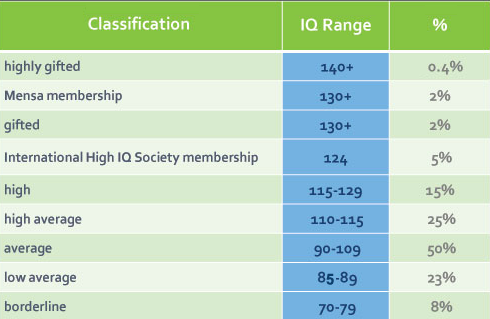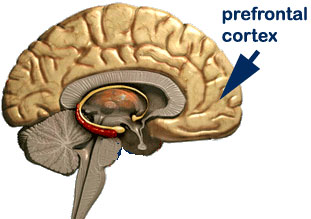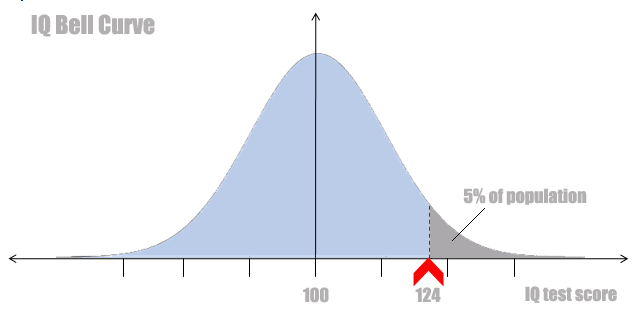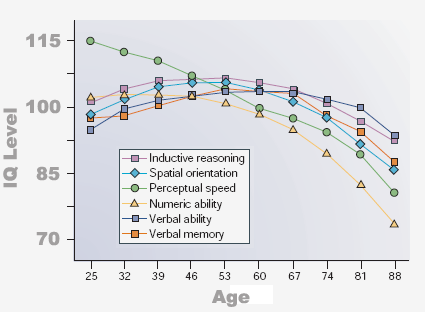What Is A High IQ Score?
An IQ of 115 is a standard definition of a ‘high IQ’, and most professions are open to individuals with an IQ of this level.
However, we can define ‘high’ as at the 1 in 20 or top 5% level. This is an IQ of 124.
An IQ of 124 is needed to become a member of the International High IQ Society. This is the first entry-point score into high IQ societies.
At the next step up, around 2% of the population has an IQ greater than 130 which is ‘gifted’ intelligence. This is an IQ of 2 standard deviations from the average IQ. This is Mensa standard – IQ score on a valid, standardized IQ test required to become a member of Mensa. (Click here for a Mensa tutorial.)
This table can help you interpret IQ scores in terms of relative IQ rankings:

Advantages of a High IQ
The advantages of having a high IQ score include brain fitness and performance.
Athletes have known for a long time that athletic performance benefits from targeted training that has a scientific basis. Scientific has revolutionized sporting achievement. The same approach is now being applied to the brain, to optimize its performance.
- The brain is a physical organ, and like other organs or muscles in the body it can be trained to be fitter and more efficient.
- Your IQ is not just your ability to solve problems – it is a measure of your overall brain fitness and efficiency.
There are two ways the brain can increase its power and efficiency as IQ increases:
- Brain plasticity – the ability of brain to reorganise itself by growing new brain cells or connections.
- Energy supply to the brain – particularly when it’s working hard.

With a smarter brain, there are all-round cognitive benefits for attentional focus and grit, problem solving efficiency, learning capacity and memory – much like there are all-round physical benefits to being in good shape physically. Having a higher IQ also directly improves health and life-expectancy as this data shows:
A High IQ as ‘Cognitive Capital’ in the Knowledge Economy
According to Jerry Muller in his article Capitalism and Inequality in the March 2013 s issue of Foreign Affairs, we live in a ‘cognitive economy’ where cognitive ability is at a premium:
“…a period of growing equality of access to education and increasing stratification of marketplace rewards, both of which have increased the importance of human capital. One element of human capital is cognitive ability: quickness of mind, the ability to infer and apply patterns drawn from experience, and the ability to deal with mental complexity. Another is character and social skills: self-discipline, persistence, responsibility. And a third is actual knowledge. All of these are becoming increasingly crucial for success in the postindustrial marketplace.”
Quickness of mind, the ability to infer and apply patterns and deal with mental complexity – these are all aspects of our general intelligence. They are all critical in our knowledge based economy.
For more information on IQ as cognitive capital in the knowledge economy click here.
Biohacking & Self-Quantified Cognitive Performance
Due to its neuroplasticity effects, i3 Mindware is a ‘biohack’ – a technological intervention to improve cognitive performance.
[box type=’notice’]A biohacker (or “wetware hacker”) is similar to a computer hacker who creates and modifies computer software or computer hardware as a hobby, but he or she does it with their body, brain and biology.[/box]
Biohacking has joined forces with the self-quantification movement resulting in a philosophy of self-experimentation and scientifically based training and technological intervention to improve human potential and performance – both physical and cognitive.
People using the self-quantification approach track and quantify the widespread cognitive and neuroplasticity effects of increasing IQ. Apart from the measurable effects on learning ability, problem solving, reasoning and attentional focus, i3 training has other effects on brain performance – such as the amount of REM sleep during a night’s sleep. REM sleep is known to play an important role in learning and consolidating memories.
For more information on biohacking and self-quantifying IQ levels, click here.
Countering Cognitive Aging & Loss of Cognitive Functioning
Aging entails many physical, biological, chemical, and psychological changes. The brain is no exception to this phenomenon. As we age, particularly beyond our mid 40s, there is a general drop in cognitive performance in problem solving and reasoning ability, spatial ability, as well as short term memory.
This cognitive decline is a normal process, with cognitive decline symptoms including forgetfulness, distractability, less efficient learning and less flexibility and power in problem solving. It is known there is a decrease in grey matter (dedicated processing circuitry) in the brain between adulthood and old age, whereas white matter (long range connectivity) in the brain increases from age 19-40, and decline after this age.
Overcoming Attention Disorders
Attention deficit disorders include symptoms such as inattention, easy distractibility, disorganization, procrastination, and forgetfulness. The working memory capacity training used in i3 Mindware directly trains the executive and attentional control mechanisms that are weakened in attention disorders. This training has been shown in replicated studies to result in these attention-related cognitive benefits (reviews: Morrison & Chein, 2011; Salminen, Strobach & Schubert, 2012):
- Multi-tasking – i.e. attentional selection between two sets of information associated with different tasks.
- Detaching attention from irrelevant items and attending to new relevant items.
- Shielding against interfering information.
- Reduced symptoms of ADHD.
- Improvements for frontal lobe stroke patients.
Thus i3 Mindware training can be an effective ADHD strategy, as well as a useful training method for less pronounced attention disorders.



